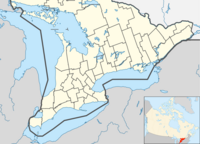Merrickville–Wolford
| Merrickville-Wolford | |
|---|---|
| Village (lower-tier) | |
| Village of Merrickville-Wolford | |

Rideau Canal locks in Merrickville
|
|
| Motto: Jewel of the Rideau. | |
| Coordinates: 44°55′N 75°50′W / 44.917°N 75.833°WCoordinates: 44°55′N 75°50′W / 44.917°N 75.833°W | |
| Country |
|
| Province |
|
| County | Leeds and Grenville |
| Settled | 1794 |
| Incorporated | January 1, 1998 (Merrickville-Wolford) |
| Government | |
| • Mayor | Dave Nash |
| • Governing Body | Council of the Village of Merrickville-Wolford |
| • Federal riding | Leeds—Grenville |
| • Prov. riding | Leeds—Grenville |
| Area | |
| • Land | 214.49 km2 (82.82 sq mi) |
| Population (2011) | |
| • Total | 2,850 |
| • Density | 13.3/km2 (34/sq mi) |
| Time zone | Eastern (EST) (UTC-5) |
| • Summer (DST) | Eastern (EDT) (UTC-4) |
| Area code(s) | 613 |
| Website | village.merrickville-wolford.on.ca |
Merrickville–Wolford is a village-status municipality in Eastern Ontario, Canada, located in Leeds and Grenville United Counties. It spans both shores of the Rideau River.
The current municipality was incorporated on January 1, 1998, by amalgamating the former village of Merrickville with the former township of Wolford.
The Rideau Canal locks at Merrickville with three locks have a total lift of twenty five feet. On the south side of the locks there is the old blockhouse, which has been restored by Parks Canada as a tourist site and museum operated by the Merrickville and District Historical Society.
In the last two decades, the region has seen a boom in the local economy mostly related to increased tourism. It is famous for its local crafts people and artists.
William Merrick, originally from Springfield, Massachusetts, founded the village of Merrickville in 1794. Attracted to the site by waterpower, he constructed a dam across the river and then built grist, saw and carding mills. It was not long before a community sprang up around the milling activity. In 1821, Merrick built a stone house overlooking his mills.
When the construction crews arrived in 1827 to build the Rideau Canal, the village of Merrick's Mills, as it was then known, was a thriving community of about 300. A plaque was erected by the Merrickville and District Historical Society in remembrance of an unknown number of persons who were buried in the McGuigan Cemetery between the years 1800 and 1900; Many died of pestilence, principally malaria, during the construction of the Rideau Canal.
Unlike most of the pre-canal sites, Merrick's Mills was not destroyed by canal construction. After the canal was completed, the excess water once again turned the wheels of the mills and the improved transportation system caused a surge in commercial activity in the village. By 1851, Merrick's Mills was an impressive industrial centre.
...
Wikipedia

